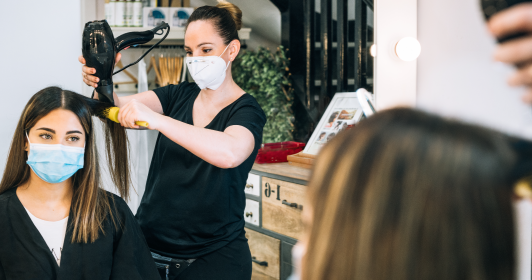
Boosting your immune system with vitamin D
, by Hi-Health, 7 min reading time

, by Hi-Health, 7 min reading time
Covid-19 poses a substantially greater risk for people who have a compromised or weakened immune system and low levels of vitamin D, according to recent studies.

Covid-19 poses a substantially greater risk for people who have a compromised or weakened immune system. Just as you should follow all CDC guidelines to prevent Covid-19 infection, you should also focus on boosting your immune system.
Your body is prime real estate for potential pathogens that can make you sick.
Like all viruses, SARS-CoV-2 (which causes the disease Covid-19), highjacks your cells to reproduce. The novel coronavirus, however, seems to have a unique ability to reproduce in an unchecked fashion, which can lead to “runaway inflammation”.1 Symptoms vary but typically include fever, dry cough, difficulty breathing, fatigue, and sore throat.
When runaway inflammation occurs, the lungs become severely damaged, which limits their ability to stretch and take in oxygen. At this stage, a person may be put in a medically induced coma and placed on a ventilator. In some cases, the virus can spread beyond the respiratory tract and ravage other organ systems, such as the heart, kidneys, liver, and gut. Notably, Covid-19 can cause blood clots, which can result in a stroke.
Fortunately, the immune system defends against nasty invaders of all kinds—including the novel coronavirus. Innate immunity is the first line of defense that protects us as soon as foreign microbes and pathogens try to enter the body. Over time, we also acquire adaptive immunity, which includes the antibodies that recognize past pathogens and serve to prevent reinfection. Specific test kits can let you know whether you've been exposed to coronavirus detecting antibodies associated with adaptive immunity.
Mobilizing an immune response is energetically expensive for our bodies. Certain people are more vulnerable to bacterial or viral attacks including older individuals, people who are currently sick, those with underlying health conditions, people who are stressed, and individuals that do not eat a balanced diet.
Taking care of your immune system starts with taking care of yourself. Be sure to eat a healthy varied diet, sleep well and relax, and (if you can do so while maintaining proper distance) get some sunshine.
If you're unable to get the proper nutrition from your food regularly, then supplementing with the right vitamins is essential. If you have gaps in your diet, then a good multivitamin can help meet your needs.
In addition to a well-rounded multivitamin, a separate dose of vitamin D can be considered. At the moment, people are talking about the link between vitamin D deficiency and Covid-19. If you're low on vitamin D, then taking a supplement might be helpful.
Humans get vitamins from food, however vitamin D is unique. The purest form of vitamin D comes directly from sunlight and is synthesized in the skin. Before slathering on the tanning oil and roasting in the midday sun know that a small amount of time in spent exposed to sunlight can provide what the body needs. Intermittent sun exposure from going for a walk or working in the garden is typically all that is needed. For most people, getting 15 minutes of sunshine three days a week will do the trick.2
Getting sunlight is important since very few foods contain vitamin D naturally. When they do, it's often in small quantities. Fatty fish, such as salmon, are considered to be one of the best sources of vitamin D. One serving of salmon, however, contains only around 400 IU, which is below the daily recommended amount. Cod liver oil is an excellent source of vitamin D, but it's not exactly palatable for most people.
If you don't eat fish, then getting adequate vitamin D is even more challenging. Egg yolks contain a meager 40 IU per serving. Vitamin D can be found in forfeited foods, such as yogurt, milk, or cereal, however, vitamin D is added to those foods. Most foods typically contain far less vitamin D than your body requires.
Perhaps not surprisingly then, around 50% of the population is vitamin D deficient.2 Women and older adults are especially more likely to be vitamin D deficient. If you avoid the sun and are unable to eat food that contains vitamin D (e.g., vegan), then you might be at risk for health issues. This is bad news since low levels of vitamin D are an independent risk factor for total mortality in the general population.2
Most people know that vitamin D helps the body to absorb calcium and strengthen bones, but did you know that may also aid in immune function? Vitamin D deficiency is associated with increased autoimmunity as well as increased susceptibility to infection. The World Health Organization recognizes that a lack of vitamin D may be involved in severe respiratory infections, such as pneumonia, tuberculosis and bronchitis.3 More research is needed, but some studies suggest that vitamin D supplementation can decrease the frequency and severity of respiratory infections among children. Notably, vitamin D receptors are present on many immune cell types, including antigen-presenting-cells, T cells, B cells and monocytes.
This vitamin may also modulate the immune responses, meaning the immune system doesn't over or under react.3 This is intriguing considering that the body's response to the novel coronavirus involves an overreaction of the immune system that triggers inflammation.
A recent study collected data on vitamin D levels and examined how this was related to the number of cases and mortality caused by COVID-19. The results indicated that greater vitamin D levels in the blood were associated with fewer cases of and deaths from Covid-19.5
Considering this, many individuals may benefit from taking a high-quality vitamin D supplement.
There's a difference so make sure you're getting Vitamin D3, also known as cholecalciferol. At Hi-Health, our products only include pure vitamin D3 in 2000 and 5000 IU.
Why D3? This is the natural form of vitamin D that your body makes from sunlight. Thus, D3 is better recognized and used by your body to meet its needs. Who couldn't use a little sunshine in their life—especially if it can support a healthy immune system that's firing on all cylinders?
Hi-Health's vitamins and products are checked for quality, meet all FDA standards, and have a money-back satisfaction guarantee. What you see on the label is what you get from our products.
We set a Hi-standard for ourselves, so you can achieve Hi-Health.
Pharmacology: DOI : 10.1016/j.coph.2010.04.001


![PRōZE Review [2020 Update]](http://hihealth.com/cdn/shop/articles/cbd_insider_article_graphic_featured_image-11.jpg?v=1591495027)